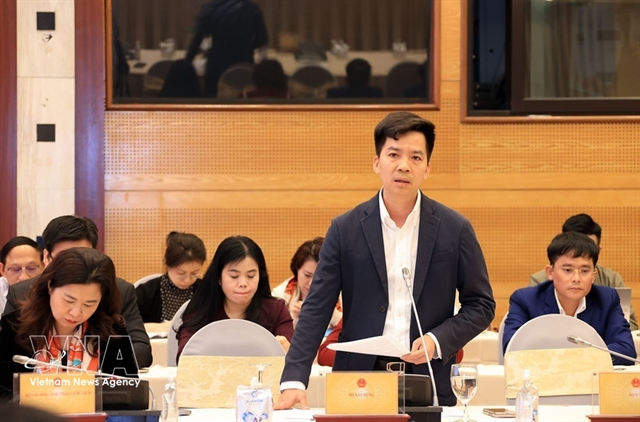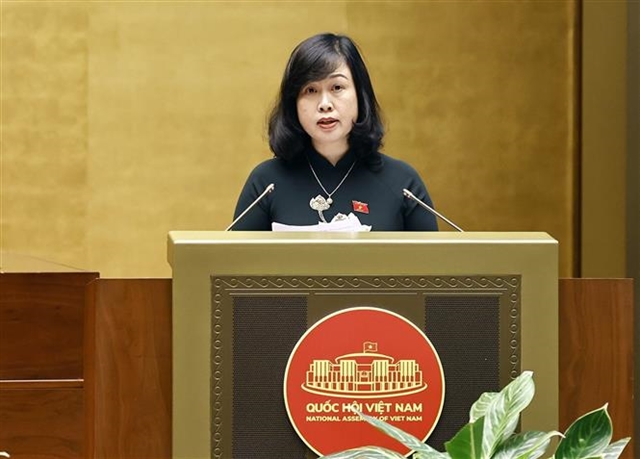 Politics & Law
Politics & Law

 |
| Minister of Health Đào Hồng Lan presenting the draft amended Health Insurance Law at the eighth session of the 15th National Assembly on Thursday. VNA/VNS Photo |
HÀ NỘI — Minister of Health Đào Hồng Lan announced that the amended Health Insurance Law will expand benefits for health insurance participants, streamline procedures, reduce out-of-pocket expenses for citizens and save costs for the health insurance fund.
She made these comments during the discussion of the draft amendment to certain provisions of the Health Insurance Law at the eighth session of the 15th National Assembly on Thursday.
Presenting the draft amended law, Lan highlighted that after 15 years of implementation, the Health Insurance Law has significantly impacted people's lives, with 93.3 million individuals, equivalent to 93.35 per cent of the population, participating in health insurance.
This achievement underscores the appropriateness and effectiveness of health insurance policies based on the principle of risk sharing, ensuring financial resources for healthcare needs and promoting social security and international integration. However, challenges and limitations have arisen during its implementation that require adjustments.
Lan noted that the draft law proposes amendments to 40 articles. Among these are regulations to transition from four tiers of healthcare services to three levels of technical specialisation, which will take effect on January 1, 2025, in alignment with the Law on Examination and Treatment.
She also discussed updates to regulations regarding on-plan and off-plan healthcare services based on the technical specialisation levels outlined in the 2023 Law on Examination and Treatment. The draft law eliminates referral procedures for certain rare and severe illnesses, allowing direct access to higher-level care to reduce bureaucracy, facilitate access, and lower out-of-pocket costs for patients.
Additionally, the draft modifies the registration process for initial healthcare services covered by health insurance and the transfer of patients between healthcare facilities, enhancing convenience for the public and delegating authority to provincial health departments regarding initial healthcare service registrations and the allocation of health insurance cards.
The draft amended law also introduces a mechanism for reimbursing medication transfers in cases where drugs have been procured according to the most convenient regulations of the new Procurement Law, addressing drug shortages and ensuring that health insurance participants do not bear the cost of medications themselves.
The proposal updates the reimbursement mechanism for clinical service costs transferred to qualified facilities as stipulated. It also includes a specific reimbursement process for healthcare services for armed forces personnel and residents in border areas, particularly in communes and islands.
The draft amended law further reduces the management cost ratio of the health insurance fund from 5 per cent to 4 per cent, allowing for an increase in direct healthcare spending from 90 per cent to 91 per cent starting next year. This will help save time and effort in budget allocation and adjustment.
In her report, Nguyễn Thúy Anh, Chairwoman of the National Assembly’s Committee for Social Affairs, noted that the draft law has further expanded benefits for health insurance participants. However, she emphasised the need for a thorough assessment of its impact on the financial balance of the health insurance fund and the organisation and operation of the healthcare system, including primary healthcare.
Regarding late payments and evasion of health insurance contributions, Anh said the committee underscored the importance of clarifying the definitions of ‘late payment’ and ‘evasion of health insurance contributions’ in Article 2, as well as specifying penalties for these violations.
She stressed the need for a detailed impact assessment and broad consultation with affected parties. The application of regulations from the Social Insurance Law should be carefully considered and adjusted appropriately for the health insurance sector.
Additionally, she recommended exploring supplementary measures for warning, reminding and informing businesses about late health insurance contributions for their employees before implementing administrative or criminal measures. — VNS




